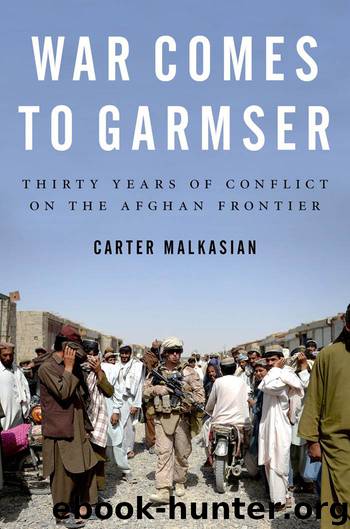War Comes to Garmser by Malkasian Carter

Author:Malkasian, Carter
Language: eng
Format: epub
Publisher: Oxford University Press, USA
Published: 2013-03-18T16:00:00+00:00
Image 8: Deputy District Governor Ayub Omar and USAID development officer Gail Long in the Mian Poshtay bazaar. (Photo from Gail Long)
Abdullah Jan did not flinch from the debate: ‘We are fighting our own people. Traitors fight their own people…This is not jihad like it was against the Russians…You were not even born in the time of our jihad. We did jihad. We fought face to face and treated the Afghan communists honorably.’ Midway through his rebuttal, one young mullah in a light blue turban and grey tunic, looking disturbingly sweaty and nervous, tried to seize the podium. Abdullah Jan growled at him and the young mullah hurriedly sat down, perhaps having heard of the old warrior’s quick hand. The most educated and moderate in the audience said nothing to defend the government. Rather, the eldest mullah derided Abdullah Jan: ‘A good Muslim prays. A good Muslim kills no innocents. A good Muslim does not love or support infidels. A good Muslim protects Islam from infidels. He will go to heaven if he dies.’ The best that it got was when Ayub Omar’s old mentor, who had taught him in the mosque as a boy, got up and spoke in favor of cooperation, if not the government: ‘ISAF came here to destroy. They destroy our crops [i.e. poppy]. But do not call any Muslim an infidel. Anyone who recites the kalima is not an infidel. Everyone, whether working with the government or working with the Taliban, can be a good Muslim.’27
Abdullah Jan and Ayub Omar did not abandon their plan to reach out to the religious leaders, even though it would not be easy. On 1 February 2010, Abdullah Jan held a follow-on meeting with Garmser’s most prominent Islamic scholar and his entourage. He asked the scholar to work with the government. ‘We cannot support the government,’ the scholar said. ‘It needs to stand up for itself. It is controlled by foreigners. Non-Muslims need to get out of our country. We can only support the government when the foreigners leave.’ The mullahs claimed that the war was a jihad against the coalition. Abdullah Jan replied: ‘Then why were you fighting when no Americans were here? Why did the Taliban announce jihad against me?’ Unmoved, one of the mullahs warned: ‘District governor, they will leave you! You will be alone’—a comment that highlighted both how transient our presence looked to those who had endured thirty years of war and how deeply the religious leaders believed in the Taliban.28
The religious leaders were one group opposed to the government. The immigrants were another. Land-owning immigrants, particularly the Ghilzai tribes in the east, with their tribal ties to the Taliban, generally refused to get too close to the government. Landless immigrants living on government land aligned with the Taliban outright. They feared the government would take back the land the Taliban had given them. Many hoped the Taliban would return and protect them. The government had no policy to let them lease their land, let alone recognize ownership.
Download
This site does not store any files on its server. We only index and link to content provided by other sites. Please contact the content providers to delete copyright contents if any and email us, we'll remove relevant links or contents immediately.
| Arms Control | Diplomacy |
| Security | Trades & Tariffs |
| Treaties | African |
| Asian | Australian & Oceanian |
| Canadian | Caribbean & Latin American |
| European | Middle Eastern |
| Russian & Former Soviet Union |
The Secret History by Donna Tartt(16763)
The Social Justice Warrior Handbook by Lisa De Pasquale(11517)
Thirteen Reasons Why by Jay Asher(7857)
This Is How You Lose Her by Junot Diaz(5846)
Weapons of Math Destruction by Cathy O'Neil(5096)
Zero to One by Peter Thiel(4889)
The Myth of the Strong Leader by Archie Brown(4823)
Promise Me, Dad by Joe Biden(4495)
Beartown by Fredrik Backman(4491)
How Democracies Die by Steven Levitsky & Daniel Ziblatt(4469)
Stone's Rules by Roger Stone(4458)
The Fire Next Time by James Baldwin(4401)
100 Deadly Skills by Clint Emerson(4130)
A Higher Loyalty: Truth, Lies, and Leadership by James Comey(4076)
Rise and Kill First by Ronen Bergman(4066)
The David Icke Guide to the Global Conspiracy (and how to end it) by David Icke(3935)
The Farm by Tom Rob Smith(3912)
Secrecy World by Jake Bernstein(3829)
The Doomsday Machine by Daniel Ellsberg(3775)
